Abortion Ballot Measures Aren’t Safe From the Courts
People are understandably excited about statewide votes on abortion, but they could be gutted by a future Trump administration or by conservative judges.
Photo: Shutterstock AbortionPolitics 2024 Election
There could be nearly a dozen constitutional amendments codifying the right to abortion on the ballot this fall—and some could even overturn active abortion bans, like in Florida, Missouri, and South Dakota. But abortion ballot measures are not a magic fix: They don’t immediately undo bad laws, as evidenced by Ohio advocates having to file multiple lawsuits to challenge past restrictions, and they can’t bring back clinics that closed. And there’s one more vulnerability we’re not talking about: Pro-choice ballot measures aren’t safe from a future Trump administration, or the conservatives on the Supreme Court.
Statewide abortion votes have been a bright spot in politics since the Dobbs decision, as the pro-choice position has won in every state where it’s already been on the ballot. In the past two years, voters in Ohio, Michigan, California, and Vermont have voted to protect abortion rights in their constitutions, while people in Kansas, Kentucky, and Montana rejected anti-abortion measures.
But every single amendment codifying the right to abortion could be undone either via a Supreme Court ruling establishing fetal personhood nationwide or Trump enforcing the Comstock Act of 1873. (No, Donald Trump doesn’t actually believe abortion should be left to the states, he’s just saying that to win.) Alternatively, state Supreme Courts could use personhood to overturn ballot measures one by one.
Rachel Rebouché, a professor at Temple University Beasley School of Law, said we should expect conservatives to file lawsuits challenging successful ballot measures—after all, anti-abortion activists have wanted to declare fetuses as people from practically the moment Roe v. Wade was decided in 1973. “On the back of a wave of successful initiatives, there will be a wave of litigation to test the boundaries of them,” Rebouché told Jezebel, adding. “I don’t think there’s an anti-abortion movement in our country that throws up its hands and says, ‘Oh well.’”
Overruling Roe was quite unpopular. But the public outcry hasn’t fazed some members of the court. Samuel Alito doesn’t care.
Specifically, we should expect challenges arguing that fertilized eggs, embryos, and fetuses are people in the eyes of the law, said Melissa Murray, a professor at New York University School of Law and co-host of the Strict Scrutiny podcast. “These ballot initiatives ensuring reproductive freedom could be viewed as obviating the rights of the fetus,” Murray said. Personhood lawsuits are “one tactic that could be used to blunt the force of the people.”
If for some reason you don’t believe these law professors, listen to people in states that have already protected abortion rights. Michigan Gov. Gretchen Whitmer (D) recently said a second Trump term could void past ballot measures, including her state’s from 2022. And in Ohio, “abortion is still very much on the ballot” in November, according to Kellie Copeland, executive director of Abortion Forward, formerly Pro-Choice Ohio. That’s because a federal ban “would supersede the work that has been done in Ohio and other states,” she said.
How the Supreme Court Could Grant Rights to Embryos

Photo: Shutterstock
In 2022, Tim Busch, a conservative lawyer and pal of Federalist Society goon Leonard Leo, said his “good friend Charles Koch” always talks about the right to life being granted in the Declaration of Independence, it just hasn’t been enforced. Busch himself said the 14th Amendment “gives that Declaration of Independence right to the unborn. At the time it was passed, [in] almost all of the states, it was murder to abort the unborn. So I think that we’re going to see a case in the next five to 10 years that could undermine these constitutional state amendments.” This was a month after the Supreme Court overturned Roe and as multiple ballot measures were in the works. Advocates are really not hiding their plan to establish fetal personhood and ban abortion.
This “our founding fathers said blastocysts have rights” theory is nonsense for several reasons. First, the 14th Amendment was adopted after the Civil War to grant citizenship and other rights to formerly enslaved people, and it confers due process rights to “persons,” and fertilized eggs are not people. Plus, in the 19th century, pregnancy was really only thought to begin at “quickening,” or when the pregnant person could feel movement, sometime in the second trimester. When the 14th Amendment was ratified, many states did ban abortion after quickening, but before that marker, women who missed their periods used herbal remedies and pills to “restore the menses” legally.
😳Leonard Leo ally Tim Busch opines that state constitutional amendments protecting abortion rights conflict w/ the 14th Amendment to the US Constitution, which he says gives that “right [to life] to the unborn.” Implies they will ask SCOTUS to overturn such state amendments. 1/ pic.twitter.com/Zckz6rG1QN


